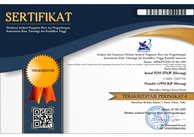EFEKTIVITAS PROGRAM PEMBELAJARAN DENGAN MENGGUNAKAN PERMAINAN TRADISIONAL UNTUK MENGEMBANGKAN KECERDASAN MAJEMUK ANAK USIA DINI
DOI:
https://doi.org/10.22460/p2m.v3i1p9-18.472Abstract
This study aims at investigating the effectiveness of learning programs using traditional games to develop early childhood’s multiple Intelligence in TK Kartika XIX-3 and TK Pandiga Cimahi. This study is motivated by the discovery of early childhood’s multiple intelligence possibility developments that has not been developed well, so that it needs developing optimally by applying traditional games learning program. To formulate program framework and find data as material for program formulation, this study uses quantitative approach and quasi-experiment method. The sample of this study is group B TK Kartika XIX-3 and TK Pandiga consisting of 18 students of class control and 18 students of class experiment. The procedures of this study consist of pre-field, implementing study, data analysis and study report. The results of this study show that: First, the development of early childhood’s multiple intelligence is various for every student. Second, learning program of traditional games has the following formulation: rationality, purpose, target and scope. Third, learning program through traditional games is effective to develop early childhood’s multiple intelligence. Based on the results, the mean of class experiment is 172, 70 higher than class control whose mean is 143,550. It means that class experiment’s multiple intelligence is better than class control; in other words, the treatment given to class experiment in the form of learning program through traditional games is effective to develop students’ multiple intelligence. Based on the results above, this study recommends that kindergarten teachers should formulate learning programs in accordance with curriculum that is related to particular learning themes in order to develop theoretical or practical learning activities for students, so that they are able to develop their multiple intelligence dominant in their selves. The researchers themselves should apply kinds of games that are suitable for developing children’s multiple intelligence so that it will appear optimally.Keywords: multiple intelligence, traditional games, early childhoodReferences
Achroni, Keen (2012) Mengoptimalkan Tumbuh Kembang Anak Melalui Permainan Tradisional. Jakarta: Javalitera.
Armstrong, T. (2009). Multiple Intelligence in The Classroom. Alexandria, Virginia US: ASCD. Anak Cerdas Panduan membantu anakBelajar Dengan memanfaatkan multiple intelligence-nya. Alih bahasa: Rina Buntaran. Jakarta: Gramedia Pustaka Utama.
Campbel, Linda, Campbel, Bruce, dan Dickson. (2006) Metode Praktis Pembelajaran Berbasis Multiple Intelligences, Alih Bahasa Tim Intuisi. Jakarta: Intuisi Press.
Creswell, W.J. (2008). Research Design: Qualitative & Quntitative Approach, Third Edotion. London: SAGE Publication.
Hastjarjo. Dicky (2008). Ringkasan buku Cook & Campbell. (1979). Quasi- Experimentation: Design & Analysis Issues for Field Settings. Houghton Mifflin Co.
Hurlock, E.B. (1980). Psikologi Perkembangan suatu pendekatan sepanjang rentang Kehidupan. Penerjemah: Istiwidayanti. Jakarta: Erlangga.
Ismail. Andang. (2006). Education Games Menjadi Cerdas dan Ceria dengan Permainan Edukatif. Yogyakarta: Pilar Media.
Jamaris, M (2004). Assesmen Pendidikan Anak Usia Dini, Seminar dan Lokakarya Nasional Pendidikan Anak Usia Dini di Jakarta.
Kwartolo. Yuli. (2005). Jurnal Pendidikan Penabur - No.04 / Th.IV / Juli 2005 Sumber intrapersonal ways of knowing (Adapted by Leslie Wesman from the work of Howard Gardner, Thomas Armstrong. Linda Campbell, and David Lazear.
Lwin, M. at.all. (2008). Cara Mengembangkan Berbagai Komponen Kecerdasan. Alih bahasa: Christiane Sujana. Jakarta: Indeks.
M. Husna. (2009) Permainan Tradisional Indonesia Untuk Ketangkasan, dan Keakraban Sesuai untuk Edukasi, Training, dan Outbond. Yogyakarta: ANDI.
Musfiroh, Tadkiroatun. (2011). Pengembangan Kecerdasan Majemuk. Jakarta: Universitas Terbuka.




.png)









